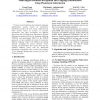1209 search results - page 10 / 242 » Using Prosodic Features in Language Models for Meetings |
ICASSP
2009
IEEE
15 years 6 months ago
2009
IEEE
For effective training of acoustic and language models for spontaneous speech such as meetings, it is significant to exploit the texts available in a large scale, which may not b...
LREC
2008
15 years 1 months ago
2008
ProPOSEL is a prototype prosody and PoS (part-of-speech) English lexicon for Language Engineering, derived from the following language resources: the computer-usable dictionary CU...
ICPR
2006
IEEE
16 years 22 days ago
2006
IEEE
Previous research indicates that automatic language identification systems based on phonotactic information produce the best results compared with other systems based on acoustic ...
COGSCI
2010
14 years 11 months ago
2010
Recent research suggests that language evolution is a process of cultural change, in which linguistic structures are shaped through repeated cycles of learning and use by domain-g...
CDC
2008
IEEE
15 years 6 months ago
2008
IEEE
— The goal of this paper is to develop modeling techniques for complex systems for the purposes of control, estimation, and inference: (i) A new class of Hidden Markov Models is ...

